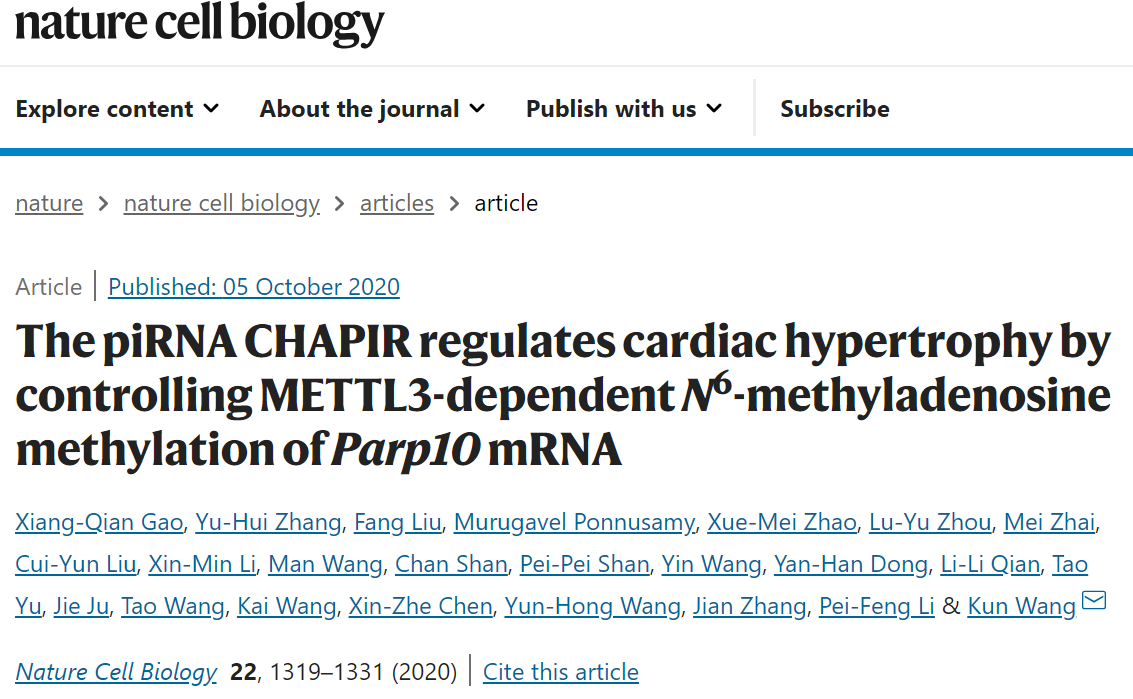Recently, Professor Kun Wang’s team at our Institute published their research results in “The piRNA CHAPIR regulates cardiac hypertrophy by controlling METTL3-dependent N6-methyladenosine methylation of Parp10 mRNA” online in Nature Cell Biology (IF=20.042). Qingdao University was the first author of one part, Professor Wang Kun was the corresponding author, and PhD student Gao Xiangqian was the first author.

Chronic myocardial hypertrophy and its related myocardial remodeling are main factors in the development of cardiac dysfunction, which can lead to severe heart failure. In the process of cardiac hypertrophy, a large number of noncoding nucleic acids (piRNA) that interact with PIWI proteins are expressed, but their function and molecular mechanism in cardiac hypertrophy are still unknown. Professor Wang Kun’s research team has determined that the piRNA (CHAPIR) associated with cardiac hypertrophy can promote pathological hypertrophy and cardiac remodeling by targeting the N6-methyladenosine (m6A) methylation of Parp10 mRNA mediated by METL3. The loss of CHAPIR can significantly reduce cardiac hypertrophy and restore cardiac function, while the administration of CHAPIR mimics can enhance the pathological hypertrophy response of pressure-overloaded mice. Regarding the mechanism, the CHAPIR-PIWIL4 complex directly interacts with METTL3 and blocks the m6A methylation of Parp10 mRNA transcripts, upregulating the expression of PARP10, which leads to the accumulation of nuclear NFATC4 and the progression of pathological hypertrophy.
The findings of this study indicate that the piRNA-mediated RNA epigenetic mechanism is involved in the regulation of cardiac hypertrophy, and the CHAPIR–METTL3–PARP10–NFATC4 signal transduction axis can be used as a cardiac remodeling target for the treatment of pathological hypertrophy and maladaptation. This research systematically studied a previously unrecognized function of piRNA in the regulation of pathological hypertrophy and revealed the mechanism of piRNA-mediated regulation of cardiac hypertrophy, which was preferentially achieved by the disorder of RNA m6A modification.
Professor Wang Kun is Director of the Developmental Cardiology Center, Institute for Translational Medicine at Qingdao University. His awards include the following: National Excellent Youth, Shandong Province Outstanding Youth, and Shandong Province Young Taishan Scholar. In addition to his duties as a doctoral supervisor, he has been devoted to the study of the molecular mechanism of cardiovascular diseases. He has made a series of significant progress in the field of cell biology, such as cardiomyocyte hypertrophy, apoptosis, necrosis, and autophagy. This achievement has been supported by the National Natural Science Foundation of China, the Shandong Taishan Scholars Program, and a Qingdao Huimin Special Project.
Article link: https://www.nature.com/articles/s41556-020-0576-y